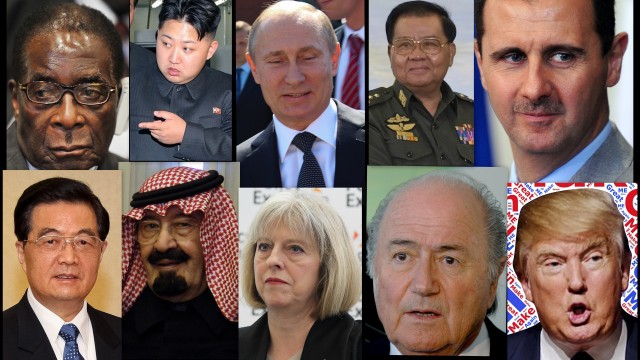
This is the fourth in an occasional series of posts asking sometimes awkward questions. Some topics are trivial, some serious, and others vital. I’d love you to join in any ensuing debate using the comments at the foot of the posts. Enjoy!
Why Do We Keep Appointing Leaders?
We’re living in pretty tumultuous times, aren’t we? Here in UK we have the uncertainties of an incompetent government led by an unelected leader dealing somewhat poorly with a Brexit situation we should never have experienced. Liars and mountebanks misled British voters into believing they could change things for the better by promoting a deal no one will ever be able to deliver. In USA, an arrogant, narcissist has emerged as a leader with no experience beyond his poor business dealings, who arrived through a series of lies and, as he would put it, ‘fake news’ reports and ‘alternative facts’, which is another term for lies. China suffers under the rule of a communist dictatorship that routinely imprisons and kills its detractors. Syria is led by an unpopular figure willing to destroy the country and kill thousands merely to hold on to power he clearly doesn’t deserve. Russia has a leader who bullies and, it is alleged, kills, to get his own way. North Korea is suppressed by a ruling family so scared of opposition it even kills its own members. Need I go on?
The world is bedevilled with leaders who are at best self-serving narcissists and at worst megalomaniac dictators willing to sacrifice millions in their pursuit of power.
And it isn’t just in politics that we suffer these figures of power. Look at the way so many business empires are led. Incompetence, corruption, theft, tax evasion, slavery posing as employment, and lying to customers are all hallmarks of many businesses. Sport is wracked by corruption of the organisations supposedly in place to control it. The churches in their various forms, are ruled by figures who are either antediluvian, prejudiced, ignorant, dictatorial or a mixture of all these qualities.
So, why do we continue to place these patently unsuitable people into positions of power? As far as I can see, the answer is simply that our current systems of control are designed to be self-protective regardless of the effects they may have on the majority of citizens. In any given state, the only legal route to change in government is through that government. And we all know the truism that turkeys don’t vote for Christmas, don’t we?
So, is the situation hopeless? I don’t think it is: not absolutely, anyway. From time to time, those of us in democratic (a much abused term) states are given the opportunity to elect new representatives. Note that the term here is ‘representatives’, not leaders. We can, if we wish, continue the patterns of the past by putting back into power those who have consistently let us down in the past. Or, here’s a thought, perhaps we could shock the system by voting for those outside the establishment, those who represent smaller political parties, or who stand as independent candidates. Of course, this would require some radical rethinking and even some radical changes to our own behaviour. But, hey, could such a system result in a new bunch of representatives that could actually make a worse job of ruling than those traditional fools we constantly put back into power? I frankly doubt it.
A short while ago, I was ‘accused’ of becoming too radical. Is that possible? Only radical change will bring about the alterations our societies so clearly need. I don’t pretend to have the answers, but I do believe that if we allow our current methods of selecting leaders to continue we will promote more and more unsuitable candidates to positions of power. And that will impact on us, the common people, in increasingly negative ways. Just look at the growing wealth gaps in most nations.
Maybe you have the answers. One of mine is that we replace leaders with a group of decision makers and appoint heads of state with no power and for ceremonial purposes only. Let’s open a debate and discuss the possibilities, no matter how strange or, dare I say it, radical? The comments section below is there for your thoughts. Express them.



Pingback: I’d Like to Know: Why? #4 Leaders | Laura E. Thomas. Seconds Away !
As a counter, it might be asserted that it is a rare leader who brings no good at all to their people.
Adolf Hitler, for example is credited with pioneering an anti-tobacco stance in Germany while he ruled the country. Under his ledership Germany became host to the most powerful anti-smoking movement in the world during the 1930s and early 1940s.
Nazi doctors were the first to write a major scientific paper linking smoking to lung cancer. Following this, Hitler (who was a heavy smoker in his early life—he used to smoke 25 to 40 cigarettes daily—but gave up the habit) banned smoking in restaurants and public transportation systems. Advertising of smoking and cigarettes was severely regulated by the Nazis, and tobacco tax was raised to deter people from smoking.
Does this in any way offset the hell and misery he unleashed on Germany and the rest of the world for so many years? Of course not. But it does provide an example of some good that came from a most flawed leader and the affecting positive ripples past down thru time upon society from an action that, in the history books at least, was overshadowed by the weight of so many more heinous and more terribly memorable decisions.
LikeLiked by 1 person
An excellent point, Glen. It’s true that we tend to forget or neglect the good that such monsters do, buried as it generally is under their more habitual wickedness. I understand that Hitler also cut housebreaking crime in Germany by a significant amount by the simple process of having the first few perpetrators, following his edict, hanged. Draconian, but effective!
It’s always good to have balance, when it’s possible, of course.
Our problem with most leaders at present is that the whole process is designed to attract the very people who are most unsuited to the role: i.e. those who seek power. It’ll take a lot of effort on the part of the electorates (most of whom appear cynically apathetic, unfortunately) to make any changes at all.
LikeLiked by 1 person